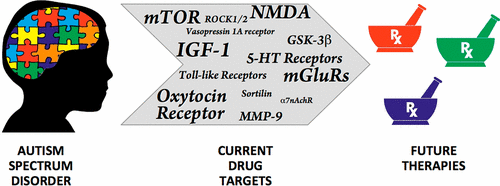当前位置:
X-MOL 学术
›
J. Med. Chem.
›
论文详情
Our official English website, www.x-mol.net, welcomes your feedback! (Note: you will need to create a separate account there.)
Targets for Drug Therapy for Autism Spectrum Disorder: Challenges and Future Directions
Journal of Medicinal Chemistry ( IF 7.3 ) Pub Date : 2017-10-30 00:00:00 , DOI: 10.1021/acs.jmedchem.7b00965 Enza Lacivita 1 , Roberto Perrone 1 , Lucia Margari 2 , Marcello Leopoldo 1
Journal of Medicinal Chemistry ( IF 7.3 ) Pub Date : 2017-10-30 00:00:00 , DOI: 10.1021/acs.jmedchem.7b00965 Enza Lacivita 1 , Roberto Perrone 1 , Lucia Margari 2 , Marcello Leopoldo 1
Affiliation

|
Autism spectrum disorder (ASD) is a neurodevelopmental disorder characterized by persistent deficits in social communication and interaction and restricted, repetitive patterns of behavior, interests, and activities. Various factors are involved in the etiopathogenesis of ASD, including genetic factors, environmental toxins and stressors, impaired immune responses, mitochondrial dysfunction, and neuroinflammation. The heterogeneity in the phenotype among ASD patients and the complex etiology of the condition have long impeded the advancement of the development of pharmacological therapies. In the recent years, the integration of findings from mouse models to human genetics resulted in considerable progress toward the understanding of ASD pathophysiology. Currently, strategies to treat core symptoms of ASD are directed to correct synaptic dysfunctions, abnormalities in central oxytocin, vasopressin, and serotonin neurotransmission, and neuroinflammation. Here, we present a survey of the studies that have suggested molecular targets for drug development for ASD and the state-of-the-art of medicinal chemistry efforts in related areas.
中文翻译:

自闭症谱系障碍的药物治疗目标:挑战和未来方向
自闭症谱系障碍(ASD)是一种神经发育障碍,其特征在于社交沟通和互动方面的持续缺陷以及行为,兴趣和活动的受限,重复模式。ASD的病因包括多种因素,包括遗传因素,环境毒素和应激源,免疫反应受损,线粒体功能障碍和神经炎症。ASD患者表型的异质性和该病的病因复杂,长期以来一直阻碍着药物治疗方法的发展。近年来,将小鼠模型的发现与人类遗传学相结合,在理解ASD病理生理学方面取得了长足的进步。目前,治疗ASD核心症状的策略旨在纠正突触功能障碍,催产素,血管加压素和5-羟色胺神经传递异常以及神经发炎。在这里,我们对研究进行了调查,这些研究提出了ASD药物开发的分子靶标以及相关领域中最新的药物化学研究成果。
更新日期:2017-10-30
中文翻译:

自闭症谱系障碍的药物治疗目标:挑战和未来方向
自闭症谱系障碍(ASD)是一种神经发育障碍,其特征在于社交沟通和互动方面的持续缺陷以及行为,兴趣和活动的受限,重复模式。ASD的病因包括多种因素,包括遗传因素,环境毒素和应激源,免疫反应受损,线粒体功能障碍和神经炎症。ASD患者表型的异质性和该病的病因复杂,长期以来一直阻碍着药物治疗方法的发展。近年来,将小鼠模型的发现与人类遗传学相结合,在理解ASD病理生理学方面取得了长足的进步。目前,治疗ASD核心症状的策略旨在纠正突触功能障碍,催产素,血管加压素和5-羟色胺神经传递异常以及神经发炎。在这里,我们对研究进行了调查,这些研究提出了ASD药物开发的分子靶标以及相关领域中最新的药物化学研究成果。


























 京公网安备 11010802027423号
京公网安备 11010802027423号